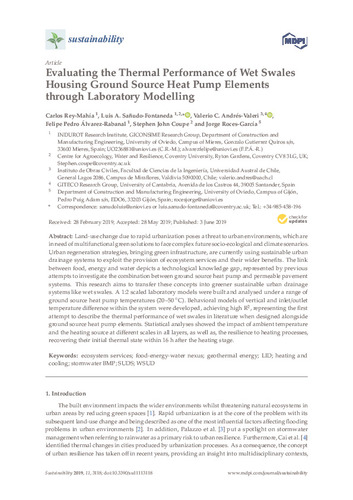Evaluating the Thermal Performance of Wet Swales Housing Ground Source Heat Pump Elements through Laboratory Modelling
Palabra(s) clave:
ecosystem services
food-energy-water nexus
geothermal energy
LID
heating and cooling
stormwater BMP
SUDS
WSUD
Fecha de publicación:
Editorial:
MDPI
Versión del editor:
Citación:
Descripción física:
Resumen:
Land-use change due to rapid urbanization poses a threat to urban environments, which are in need of multifunctional green solutions to face complex future socio-ecological and climate scenarios. Urban regeneration strategies, bringing green infrastructure, are currently using sustainable urban drainage systems to exploit the provision of ecosystem services and their wider benefits. The link between food, energy and water depicts a technological knowledge gap, represented by previous attempts to investigate the combination between ground source heat pump and permeable pavement systems. This research aims to transfer these concepts into greener sustainable urban drainage systems like wet swales. A 1:2 scaled laboratory models were built and analysed under a range of ground source heat pump temperatures (20–50 ºC). Behavioral models of vertical and inlet/outlet temperature difference within the system were developed, achieving high R2, representing the first attempt to describe the thermal performance of wet swales in literature when designed alongside ground source heat pump elements. Statistical analyses showed the impact of ambient temperature and the heating source at different scales in all layers, as well as, the resilience to heating processes, recovering their initial thermal state within 16 h after the heating stage.
Land-use change due to rapid urbanization poses a threat to urban environments, which are in need of multifunctional green solutions to face complex future socio-ecological and climate scenarios. Urban regeneration strategies, bringing green infrastructure, are currently using sustainable urban drainage systems to exploit the provision of ecosystem services and their wider benefits. The link between food, energy and water depicts a technological knowledge gap, represented by previous attempts to investigate the combination between ground source heat pump and permeable pavement systems. This research aims to transfer these concepts into greener sustainable urban drainage systems like wet swales. A 1:2 scaled laboratory models were built and analysed under a range of ground source heat pump temperatures (20–50 ºC). Behavioral models of vertical and inlet/outlet temperature difference within the system were developed, achieving high R2, representing the first attempt to describe the thermal performance of wet swales in literature when designed alongside ground source heat pump elements. Statistical analyses showed the impact of ambient temperature and the heating source at different scales in all layers, as well as, the resilience to heating processes, recovering their initial thermal state within 16 h after the heating stage.
Descripción:
The authors wish to acknowledge the CAWR, Coventry University, for the administrative support; and the GITECO Research Group, University of Cantabria, for housing the laboratory experiments.
DOI:
Patrocinado por:
This research was funded by the following Institutions: Coventry University through the project “Investigation of green infrastructure as a combined technique for Bioretention, Flood Resilience and Renewable Energy”; the Gijon City Council and the IUTA through the projects SV-18-GIJON-1-23; the FICYT through the GRUPIN project Ref. IDI/2018/000221, co-financed with EU FEDER funds; and the University of Oviedo through the project PAPI-17-PEMERG-22.
Colecciones
- Artículos [37549]
- Construcción e Ingeniería de Fabricación [508]
- Indurot [171]
- Investigaciones y Documentos OpenAIRE [8420]
Ficheros en el ítem





